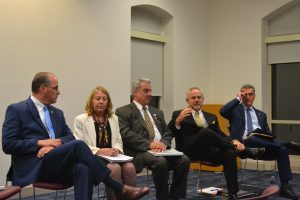
SNOW HILL – Inequities in the state’s funding formula and a potential increase in education costs highlighted concerns expressed by local officials regarding the recommendations of the Kirwan Commission.
On Tuesday, local elected officials joined school system and county staff to talk about changes that could be coming to Worcester County’s public schools if recommendations from the Kirwan Commission, which was created to improve Maryland’s public education system, become law.
“What we do know is regardless of what happens in Annapolis, Worcester County will do what it has always done—work together to ensure we continue to provide students an exceptional education experience based on individual student needs, opportunities and county resources,” Worcester County Commissioner Chip Bertino said.
While local officials don’t disagree with the commission’s major goals—which include expanding prekindergarten, focusing on high quality teachers, ensuring college and career readiness and increasing accountability—they’re worried about the cost of implementing the recommendations and the financial impact on a county that already funds 80% of the school system’s budget.
Harold Higgins, the county’s chief administrative officer, said that currently, the state required counties to fund schools at a “maintenance of effort” level.
“State law has required that local governments maintain their educational funding effort from year to year on a per pupil basis by meeting or exceeding their contribution from the year before,” Higgins said, adding that the county also funded educational costs that weren’t included in the maintenance of effort calculation.
Based on current criteria, maintenance of effort (MOE) funding for Worcester County Public Schools is $91 million. That is expected to grow to $113.7 million by 2030. Kirwan recommendations would increase that figure to $119.1 million in 2030.
Bertino said the current MOE formula was unfair to Worcester County taxpayers, as they were forced to fund a far greater percentage of the school system’s budget than taxpayers in other counties.
“By comparison, local taxpayers in the neighboring counties of Wicomico and Somerset fund only about 20% of their respective boards of education budgets,” Bertino said. “How is that fair?”
He said that reviewing the maintenance of effort funding formula was a stated objective at the inception of the Kirwan Commission but was never actually done.
“Rather than address and fix the inequities of the MOE formula suffered by Worcester and other counties, the Kirwan Commission recommendations bake the inequities into funding projections going forward, thus ensuring no relief for Worcester County taxpayers,” Bertino said.
He stressed that the financial impact of the Kirwan recommendations on Worcester was jarring. He said they would mandate increased spending even though Worcester County already spent more per student than any other school district. He added that there was no flexibility for the county in applying the recommendations in ways that made sense locally.
“One size does not fit all,” he said.
Superintendent of Schools Lou Taylor also expressed concern in that regard.
“We certainly agree with the commission on many of its recommendations and overarching goals,” Taylor said. “It also seems to me that these recommendations are designed to bring other counties in the state up to Worcester County’s level of performance and success.”
Because the school system was already one of the best performing in the state, he said he hoped legislators would allow the county to continue local control of its educational decisions.
“Otherwise I know many of our locally identified priorities could take a backseat to state mandates designed for lower performing county school systems,” he said.
Sen. Mary Beth Carozza, a recent addition to the Kirwan Commission, said she too agreed with its overall goals but was worried about how they’d be funded. She pointed out that commission members spent years reviewing education policies and creating goals that would improve education in Maryland but failed to put sufficient focus on how those improvements would be funded.
Carozza said she would use her position on the commission to press local priorities and concerns such as affordability and fairness in the state’s funding formula as well as transparency and accountability.
“We are spending a record number already on education,” she said. “When you’re spending that much money on education, before you even start talking about increases in education funding I think we have an obligation to know how was the money spent in the past? What were the outcomes? I don’t think that we have done justice yet on accountability.”
Carozza said she was also hoping the Kirwan Commission would look at learning environment issues. She’s heard concerns from area teachers who feel overall student performance is negatively impacted when teachers have to deal with interruptions in the classroom. She wants to make sure teachers have the authority they need.
“If there are not the tools in place to address that situation it’s going to continue to have an overall effect on student performance,” she said.
Carozza said the Kirwan Commission would meet again Nov. 12.

